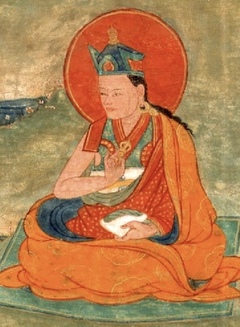Advice on Three Sets of Vows
Advice on the Three Sets of Vows[1]
from The Essential Amrita of Profound Meaning: Oral Instructions and Practical Advice Bestowed Upon Fortunate Followers, Eye-Opener to What Is to Be Adopted and Abandoned
by Chokgyur Dechen Lingpa
Here is some advice on how to practice the three sets of vows
Within the mindstream of a single person,
As well as how given individuals can practice
Whichever of the three they aspire toward.
There are eight forms of personal liberation[2] vow in the lesser vehicle.
Keep whichever you can to the best of your ability;
This is easy to understand.
For the trainings in the precepts of the bodhisattva,
It was taught by noble Ācārya Nāgārjuna and others
That you can take the bodhicitta vow before the personal liberation precepts.
This is because our Teacher conferred this vow upon gods, nāgas, and asuras;
In other words he gave it to all, regardless of their physical form (the support).
Some say that if one does not first take the personal liberation precepts,
This will obstruct the aspect of the vow that involves refraining from faulty conduct.[3]
In my own tradition, however, these two viewpoints are not contradictory:
If the personal liberation vow is taken first, that is indeed excellent,
But if not, this does not invalidate the bodhisattva vow.
When we become followers of the Victorious One,
We become holders of the threefold refuge and
By forsaking selfish aims pursue the benefit of others.
Thereby, all harm toward others is naturally avoided.
To practice like that is the perfect discipline.
In general, the lower teachings are contained within the upper.
This is known by all, and there are valid scriptures and reasonings showing just this.
In Mantra, as well, to receive the four empowerments you must keep the mantric precepts.
With the samaya of the guru, the embodiment of the Three Supreme Ones,
You become a supreme upholder of the threefold refuge.
It may be said that engaging in union is impure conduct (non-celibacy)
And therefore in conflict with the vows.
However, by not grasping at one's partner as “mine,”
But seeing him or her as divine,
By realizing the partner to be like an illusion,
And understanding the true nature of the afflictions to be bliss-emptiness,
The act is liberated through skillful means.
This then becomes perfectly pure conduct (celibacy), free of attachment and grasping.
Actions that are of direct benefit, like the killing of Short-Speared One,[4]
Are praised as great deeds, his death an excellent death;
It’s not only compassionate, but an action that elevates one to an exalted state.
Therefore, as part the samayas of secret mantra,
One indirectly receives the personal liberation and bodhisattva vows, exalted through skillful means.
The Vinaya is included within both mantra and bodhisattva teachings.
However, if one were to assume the guise of an actual renunciate
Without having obtained in proper ritual the vow of personal liberation,
It is well known that such behavior would be in contravention
Of the general discipline of the teachings.
As for alcohol, if consumed beyond measure it makes one heedless
With regards to all three vows.
It is therefore restricted at all levels. This is an important point.
Written by Chokgyur Lingpa. May it bring auspiciousness!
| Samye Translations, 2023.
Bibliography
Source Text
mchog gyur gling pa, “rjes 'jug skal bzang rnams la bstsal pa’i zhal gdams bslab bya nyams len gyi skor spang blang mig ’byed zab don snying gi bdud rtsi.” In mchog gling bka' 'bum skor. Vol. 36 of mChog gling bde chen zhig po gling pa yi zab gter yid bzhin nor bu’i mdzod chen po, 129–131. Kathmandu, Nepal: Ka-nying Shedrub Ling Monastery, 2004.
Version: 1.0-20240202
-
The original text is untitled; this title has been added by the translators. ↩
-
Skt. pratimokṣa. ↩
-
The pāramitā of ethical discipline, which is part of a bodhisattva's training, has three aspects: 1) refraining from faulty conduct, 2) undertaking positive actions, and 3) bringing benefit to others. ↩
-
This is a reference to the story of a ferry captain whose boat was carrying five captain bodhisattvas in the guise of merchants. A robber on board planned to kill everyone and pirate the ship's cargo. The captain, a bodhisattva himself, saw the man's murderous intention and realized this crime would result in eons of torment for the murderer. In his compassion, the captain was willing to take hellish torment upon himself by killing the man to prevent karmic suffering that would be infinitely greater than the suffering of the murdered victims. The captain's compassion was impartial; his motivation was utterly selfless. ↩
